外研版九年级英语上册Module 3 HeroesUnit 2
外研版-英语-九上-九上Module3 2单元 优秀教案
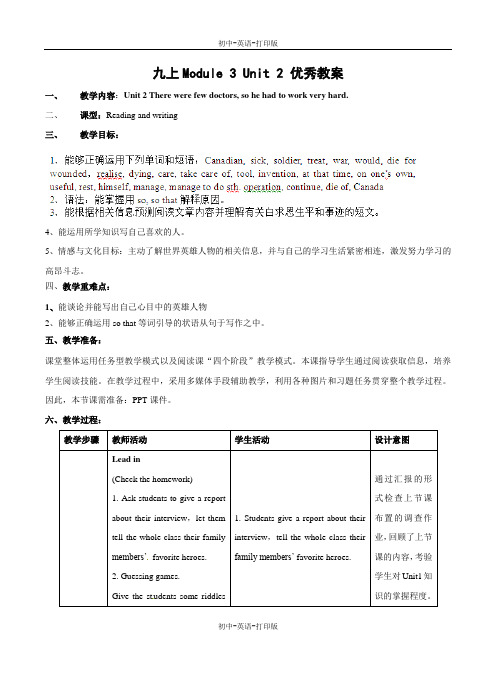
九上Module 3 Unit 2 优秀教案一、教学内容:Unit 2 There were few doctors, so he had to work very hard.二、课型:Reading and writing三、教学目标:4、能运用所学知识写自己喜欢的人。
5、情感与文化目标:主动了解世界英雄人物的相关信息,并与自己的学习生活紧密相连,激发努力学习的高昂斗志。
四、教学重难点:1、能谈论并能写出自己心目中的英雄人物2、能够正确运用so that等词引导的状语从句于写作之中。
五、教学准备:课堂整体运用任务型教学模式以及阅读课“四个阶段”教学模式。
本课指导学生通过阅读获取信息,培养学生阅读技能。
在教学过程中,采用多媒体手段辅助教学,利用各种图片和习题任务贯穿整个教学过程。
因此,本节课需准备:PPT课件。
六、教学过程:教学步骤教师活动学生活动设计意图Lead in(Check the homework)1. Ask students to give a reportabout their interview,let themtell the whole class their familymembers’favorite heroes.2. Guessing games.Give the st udents some riddles1. Students give a report about theirinterview,tell the whole class theirfamily members’ favorite heroes.通过汇报的形式检查上节课布置的调查作业,回顾了上节课的内容,考验学生对Unit1知识的掌握程度。
Step One War ming-up (3’)and guess who is.Eg: (1) He was ready to helpothers and he did a lot of goodthings When he died, he wasonly 22.(2)He spent his whole life instruggling for the freedom ofhis people. He was a presidentfrom South Africa.(3)He was a doctor who camefrom Canada, and he helpsaving the wounded Chineseduring the World War II.2. Guessing games.Guess t he answers according to thetips that the teacher gives.(1)Lei Feng(2)Nelson Mandela(3)Dr Norman Bethune提供学生几个“猜猜大家心目中的英雄”的谜语,使学生的脑袋可以迅速地转动起来,锻炼他们的思维能力,以趣味性的方式导入了本课课题。
九年级英语上册Module3HeroesUnit2教案新版外研版_

Unit 2 There were few doctors,so he had to work very hardon his own.【教学目标】【教学思路】本单元的教学内容是第三模块中的第二单元。
通过提供必要的词汇和图片让学生讨论文中主要谈论的人物是谁及其工作,激发学生的兴趣,由此引入听力,顺利地完成对特定的听力信息的捕捉。
【教学准备】黑板,录音机,多媒体等。
【教学过程】Step 1 Warming up1.师生问候。
2.幻灯片放映有关白求恩的图片,循序渐进地引导学生对白求恩进行了解,导入本课。
活动小结:通过图片形象生动地引入新课,可以激起学生的学习兴趣。
Step 2 Presentation1.学习新单词。
根据图片和单词表上的音标学习新词,引出有关的知识。
(1)学习新词“手术”时,用多媒体放映出有关手术的图片,引出operation。
(2)由名词Canada“加拿大”,引出形容词“加拿大的,加拿大人的”Canadian。
(3)展示一张卧病在床的图片,引出新词sick,形容词“不适的,生病的”,相当于ill。
(4)用多媒体展示出一张军人的图片,引出新单词soldier“军人,士兵”。
(5)用图片展示出受伤的人物,引出新词,wounded“受伤的”。
(6)教学新词war的时候,展示战争的图片,从而进行教学。
(7)展示几幅工具,器械的图片,从而引出新词tool,可数名词,“工具,器械”。
(8)展示中国古代的四大发明,从而引出新词invention,可数名词,“发明,创造”。
(9)由动词use“使用”,拓展出新词useful,形容词“有用的,有益的”。
(10)由代词him引出反身代词himself“他自己”。
(11)学习continue动词“继续”,短语continue to do sth=continue doing sth继续做某事。
(12)用多媒体展示加拿大的旗帜,引出Canada“加拿大”。
外研版九上英语Module 3 Unit 2

He developed training courses for local
doctors and nurses; and wrote books so that
they could learn about how he treat 目的状语
the sick.
从句
Dr Bethune often worked very hard w设ith法ou完t r成esting or taking care of himself. Once, he even worked for
3. What did Norman Bethune do during his stay in China? He helped treat the wounded, developed training courses for local doctors and nurses and wrote books.
sixty-nine hours without stopping and managed to
save over a hundred lives. One day in 1939, he cut
his finger during an operation, but he continued his
on one’s own
意为“独自的;独立的;主动的”。
例:我能独立把工作完成。 I am able to finish the work on my own.
continue
(1) continue 作动词,“继续”。 常用短语:continue to do/doing sth. 继续从事某事 相当于go on doing sth
Canadian doctor hospital sick soldier treat war wound
最新版外研版九年级英语上M3U2课件
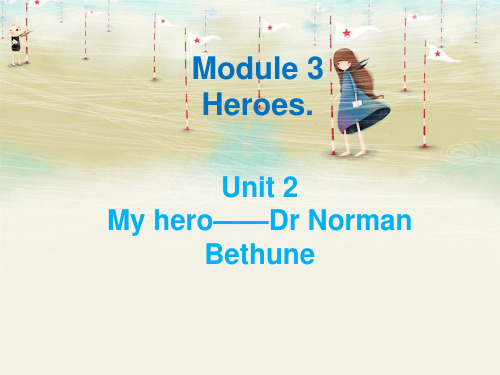
瞬间动词,表示动作 ,常用谓语,意为“ 死”
His grandpa died two years ago.
dead
形容词,意为“死的 The tree has been
,无生命的”
dead for ten years.
death
名词,意为“死亡, 去世”,常用作主语 或宾语
His death is heavier than Mount Tai.
Module 3 Heroes.
Unit 2 My hero——Dr Nd 受伤的 war 战争 develop 发展;研发 invent 发明 medical 医疗的 treat 治疗 useful 有用的 himself 他自己 operation 手术 Canada 加拿大
Dr Bethune often worked very hard without resting or taking care of himself;Once,he even worked for sixtynine hours without stopping and managed to save over a hundred lives.One day in 1939,he cut his finger during an operation,but he continued his work without treating it.In the end,he died of his wound.
Dr Bethune`s work for the Chinese people made him a hero in China.There are many books and films about him,and he is still remembered in both China and Canada today.
九年级英语外研版上册Module3_Unit2_课时训练(三)

Module 3Heroes Unit2Ⅰ.根据句意及首字母提示完成句子1. The High-speed Rail is one of the newest i in China.2.—Has he r his mistake yet?—Yes, he has already said sorry to his mother.3.If you c stealing(偷盗), you’ll end up in prison.4.Many of the w soldiers died on their way to the hospital.5.The patient is getting better and better after the o.6.You need to have a r after working hard.Ⅰ.用所给单词的适当形式填空7. The firemen who put out the forest fires bravely are the modern(hero).8. —Who helped little Tony tidy up the sitting room just now?—Nobody, he did it all by (he).9. Ma Long is one of (famous) ping-pong players in the world.10.It’s (use) for us to learn how to look after ourselves.11.The old man is (die), so we have to send him to the hospital at once.12.Qu Yuan is still (remember) by Chinese people today.Ⅰ.根据汉语意思完成句子13. 父母和孩子们都在为美好的未来而努力。
九年级英语外研版上册Module3HeroesUnit2教案教案

Module 3 Unit 2There were few doctors, so he had to work very hard on his own.一、教学内容分析本节课选自第三模块第二单元Tere few doctors, so he had to work very hard on his own.本节课主题为英雄,本模块围绕英雄这一话题,开展听,说,读,写活动。
语法重点是操练由so, so that 和because 引导的状语从句。
语言技能和语言知识主要都是围绕英雄人物这一中心话题展开。
通过了解英雄人物,培养学生爱英雄,学英雄,争做英雄的好品质,并以此发奋学习,做国家有用人才。
二、教学目标1.语言知识目标:Key vocabulary :理解army,Canada,Canadian, treat, treatment, Dr=doctor,give one’s liferont, injured, war, First World War, invent, tool, local, operate, operation, in spite of, in the end, take care of.在文中的意思,能正确的翻译。
Key structures:在语境中感知so, so that和because引导的状语从句的用法。
.2.语言技能目标:读:通过阅读My hero-Dr Norman Bethune,让学生掌握并运用略、精读的技巧,即略读找大意,精读搜索相关信息。
写:能够描写自己喜爱的英雄人物的基本简介和理由。
3.情感态度目标:通过了解英雄人物,培养学生爱英雄、学英雄、争做英雄的好品质,以此发奋学习,热爱生活,做国家有用人才。
三、学习者特征分析本课学习者的特征分析主要是根据学习基础特点及思维发展情况,加上教师平时对学生的了解而做出的: 1.知识基础:九年级的学生对探究学习与自主合作学习并不陌生,本课的教学重难点为状语从句,在八年级上册第8模块,学生学习过时间状语从句;在九年级上册第二模块,学生学习过时间状语从句,为学习目的、结果、原因状语从句打下了夯实的基础。
外研版九年级英语上册M3u2教案

1.die for为...而死die of死于... 2.close to靠近
3.so that为了,以至于4.on one’s own独自一人
5.learn about了解6.manage to do sth设法去做某事
7. in the end最终8. the wounded/sick
阅读表达,每题2分。请根据课文内容回答问题。
1.从文中找出与下列句子意思相近的句子。
Dr Bethune often did his best to work ,didn’t have a rest or
didn’t look after himself.
______________________________________________________
莘县明天中学教案页
时间:年月日主管领导签字:
教师姓名
学科 Unit2
课型
课标
要求
能搜集相关信息来预测文章的内容,能描写自己心目中的英雄人物。
学习
目标
1.能正确发音并会默写本单元单词及短语。
2.能熟读课文并会正确翻译课文,能够读懂有关英雄人物的短文。
3.学习目的状语从句,能正确运用课文相关知识,完成练习题目。
10./ɪnˈvenʃn/ n.发明11./ˈju:sfl/adj.有用的12./rest/v.休息
13./hɪmˈself/pron.他自己14./kəˈneɪdiən/adj.加拿大的
15./'kænədə/n.加拿大16.设法完成v.
17./ˌɒpəˈreɪʃn/n.手术18.继续v.
任务二:根据M3U2课文,完成阅读表达题目,注意认真书写,规范答题。
外研版英语九上Module 3《Heroes》(Unit 2)教学设计

外研版英语九上Module 3《Heroes》(Unit 2)教学设计一. 教材分析本课选自外研版英语九上Module 3《Heroes》(Unit 2),主要讲述了关于英雄的故事。
本课内容包括两部分:一是关于一个勇敢的消防员救人的故事;二是关于一个科学家在地震中救人的故事。
通过这两个故事,让学生了解英雄的品质,并学会如何表达人物的品质和救人的行为。
二. 学情分析学生已经掌握了基本的英语语法和词汇,具备一定的听说读写能力。
但是,对于一些表达人物品质和救人事迹的词汇和句型可能还不够熟悉。
此外,学生对于英雄的概念和品质可能存在片面的理解,需要通过本课的学习进行拓展和深化。
三. 教学目标1.知识目标:–学会表达人物品质的词汇和句型,如:brave, helpful, save sb.from danger等。
–学会描述救人事迹的词汇和句型,如:run quickly, climb up, pull out等。
2.能力目标:–能够用英语讲述英雄的故事,并表达自己对英雄的看法。
–能够用英语讨论如何成为一个英雄。
3.情感目标:–培养学生尊重和敬佩英雄的情感。
–引导学生从身边的小事做起,培养自己的品质,成为一个有责任感的人。
四. 教学重难点•表达人物品质和救人事迹的词汇和句型。
•用英语讲述英雄的故事,并表达自己的看法。
•描述救人事迹的细节。
•运用恰当的词汇和句型表达自己对英雄的看法。
五. 教学方法1.情境教学法:通过设置情境,让学生在实际语境中学习和使用英语。
2.任务型教学法:通过完成任务,引导学生积极参与课堂活动,提高语言运用能力。
3.情感教学法:通过讲述英雄的故事,激发学生的情感,培养学生的品质。
六. 教学准备1.教材:外研版英语九上Module 3《Heroes》(Unit 2)。
2.多媒体设备:电脑、投影仪、音响等。
3.教学课件:根据教学内容制作的课件。
4.教学资源:关于英雄的图片、视频等。
七. 教学过程1.导入(5分钟)利用多媒体展示关于英雄的图片和视频,引导学生谈论英雄的话题,激发学生的兴趣。
外研版九年级英语上册课件 Module3 Unit2
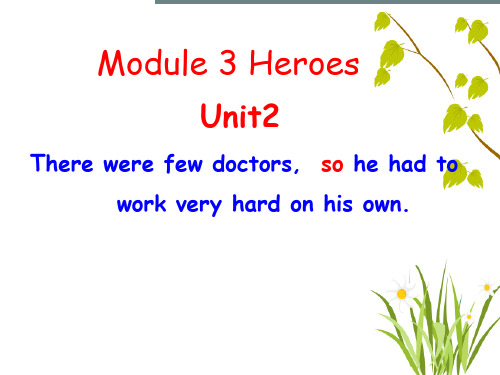
inventions saved many lives.
In 1938, Dr Bethune came to China and helped treat the wounded during
the Anti-Japanese War. At that time, there were few doctors, so he had to work
Module 3 Herw doctors, so he had to work very hard on his own.
Dabai is a hero.
Why do you Ctahninkyotuhenyamaereanhyerootehse?r heroes? ...
3. In 1938, Dr Bethune came to China and helped treat the wounded
The clue (线索): time Elucidation(分)
during the Anti-Japanese War. At that time, there were few doctors, so he had to work very hard on his own. His experience of treating people in
以便于
She gave all her life to looking after people. She was British.
She is a Chinese. She plays tennis very well. She dressed as a man fighting in the army.
He is Chinese. He has a daughter and a wife. He is from Shanghai. He is very tall. He is the best basketball player in China.
外研版九年级上M3U2

Read Paragraph 3 and then choose the best answers.
1.When did Norman Bethune come to China ? A.In 1890. B. In 1916 C. In 1938
2.He came to China to treat the wounded.
Retell
In 1938
Once In 1939 After he died
Paragraph 1
Who your hero is his/her job
Paragraph 2 Paragraph 3
Hobby……
The main stories What you can learn from him/her What you will do in the future
1890
1916
1936
He was born
He became a doctor
1.出生
be born during the war
2.战争期间
3.治疗受伤的士兵
treat the wounded soldiers
develop new ways take care of invent special medical tools
2.设法做成某事
3.在一次手术中
manage to do sth during an operation
4.continue 用法
5.最后 in the end / finally / at last die of / from
6.死于
7.白求恩医生工作非常努力,常常不辞劳作,不顾自己的
身体。
外研版九上英语 Module 3 Heroes Unit 2
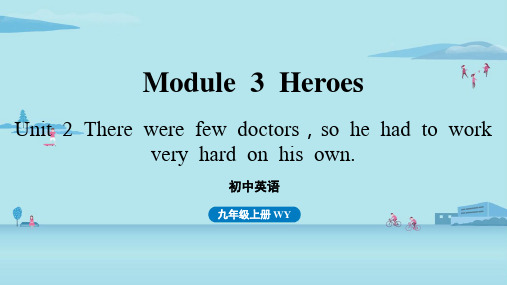
拓 take care可用于口语中,表示"保重"。▶Goodbye! Take care! 再见!(多)保重!
典例1 完成句子,每空一词。(贵阳中考改编)照顾老幼是中国的优良传统。To _____ _____ ___ the old and care for the young is a good Chinese tradition.
(2)Canada作名词,意为"加拿大",表示国家。▶Which do you think is the most attractive city in Canada?你认为加拿大最有吸引力的城市是哪个?
语境串记Mr Black comes from Canada. He is a Canadian teacher. 布莱克先生来自加拿大。他是个加拿大老师。
语境串记I have been sick for two days. The terrible smell of the medicine makes me sick. 我生病两天了,难闻的药味让我想吐。
辨 sick与ill两者都可表示"生病的",但用法有所区别。
sick
可作表语或定语
She prepared meals for her sick mother. 她为生病的母亲做饭。(作定语)My grandpa is sick/ill in hospital. 我爷爷生病住院了。(作表语)
(2)作名词,意为"款待;招待"。▶Let's go out for dinner — my treat.咱们到外面去吃晚餐吧,我请客。
教材原句 He soon realised that many people were dying because they did not get to hospital quickly enough. 他很快意识到许多人因为没有被及时送往医院而生命垂危。(教材P20)
新外研版九上M3U2 There were few doctors, so 8
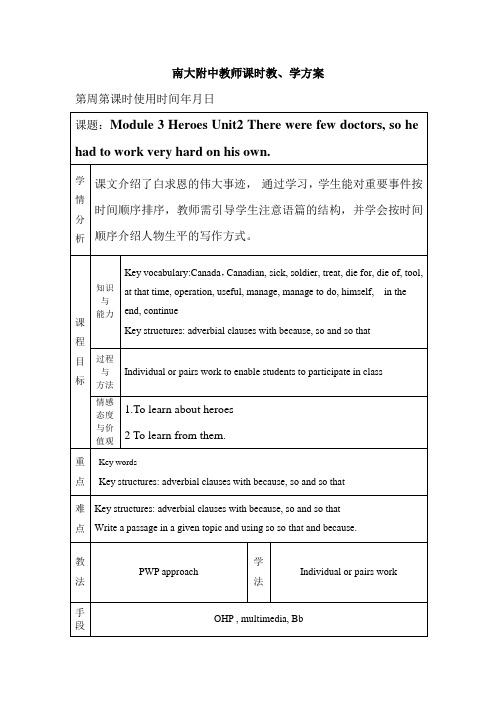
南大附中教师课时教、学方案第周第课时使用时间年月日Module 1 Unit 1 I. 根据句意和汉语提示写单词。
1. I’m sure you know the Great Wall best among the New Seven(奇迹) of the World.2. The(乐队) Dream Theatre is Linda’s favourite and she thinks they have goo d rhythm to their music.3. The young writer asked Ba Jin to write a (评论) for his new book.4. Pingyao is one of the most famous (古老的) cities in Shanxi Province.5. This morning Mr Wu t aught us how to write the (作文) for Mother’s Day.6. Do you know which is the most famous (金字塔) in Egypt7. Our class(会议) usually lasts about half an hour.8. This year the 29th Olympic Games is the most important(事件) f or every Chinese.9. Ma Ji had many(学生) and Feng Gong is one of them.10. You can find some good ideas on how to get good (成绩) in Learning English. II. 根据句意用所给单词的适当形式完成句子。
1. Sally has got two good friends(call) Lingling and Daming in Beijing.2. — How about(watch) the football match with me this afternoon—Good idea.3. — Can you tell me how (learn) English well—First you should believe you can learn it well.4. “Listen! What(happen) outside〞Sally asked.5. “Did (someone) else watch the programme ye sterday evening〞the teacher asked.6. Our English teacher suggests us (speak) English loudly every morning.7. What was your (good) grade in maths last year8. Please check whether you(write) down your name on the paper.III. 根据汉语提示完成英语句子,每空一词。
外研版英语课件九上:M3U2

Read Paragraph Four and check True or False.
True or false questions
1.He once worked for 69 hours without
stopping and managed to save leossvetrhan
a hundred lives.
( F)
2. Why did he die?
He cut his finger during an operation, but he continued his work without treating it. In the end, he died of his wound.
Read Paragraph Five and filseless
Try to fill in the blank.
In 1938 Norman Bethune came to _C_h_i_n_a__ to help _t_re_a_t_ the _w_o_u_n_d_e_d_ soldiers during the Anti-Japanese War. There were _f_e_w_ doctors, _s_o__ he had to work very hard _o_n__ _h_is_ _o_w_n_. He__d_ev_e_l_o_p_e_d_ training courses for _l_o_c_a_l _ doctors and_n_u_r_s_es_ and wrote books _s_o__ t_h_a_t _ they could learn about how to treat the __si_c_k__.
work hard
Module 3 Unit 2课件(共16张PPT) 外研版英语九年级上册

Let’s say
What is the video about? Heroes hero: a person who is respected, especially for having done something difficult or good.
Tip: It’s always a good way to use the dictionary
without treating it. He came to China to help…during the war. He developed training courses … He wrote books about how to treat the sick. He went to Spain to help…during the war.
Let’s explore
Tip: It’s important to
Why does Lingling choose these years to describe the life story?
choose typical to show a
events hero’s
His experiences in Spain and in China can best show
Does it have a timeline? Do it have the typical events? Does it have the examples?
qualities.
his good qualities as a hero.
1939
His death.
1938
HaHniesdccdoainmetrdeibftuootrioCCnhhtioninCaaht.ionahelp treat the wounded soldiers
外研版九年级英语上册Module Module 3.Heroes Unit 2 同步测试试题
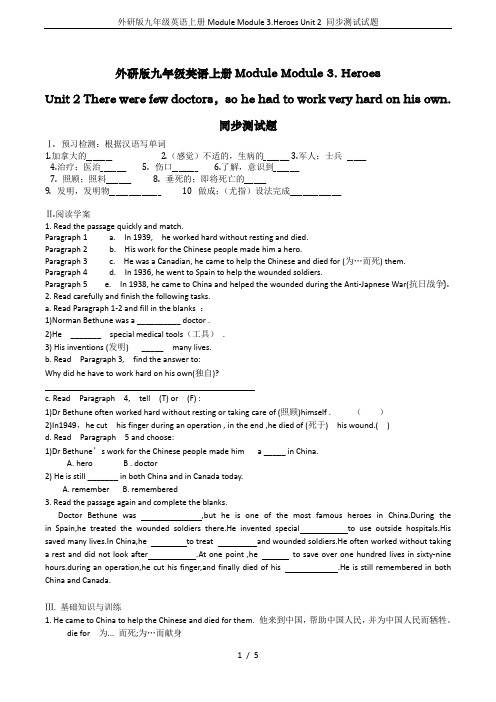
外研版九年级英语上册Module Module 3. HeroesUnit 2 There were few doctors,so he had to work very hard on his own.同步测试题Ⅰ. 预习检测:根据汉语写单词1.加拿大的________2.(感觉)不适的,生病的________3.军人;士兵______4.治疗;医治________5. 伤口________6.了解,意识到________7. 照顾;照料________ 8. 垂死的;即将死亡的_______9. 发明,发明物________________ 10 做成;(尤指)设法完成________________Ⅱ.阅读学案1. Read the passage quickly and match.Paragraph 1 a. In 1939, he worked hard without resting and died.Paragraph 2 b. His work for the Chinese people made him a hero.Paragraph 3 c. He was a Canadian, he came to help the Chinese and died for (为…而死) them. Paragraph 4 d. In 1936, he went to Spain to help the wounded soldiers.Paragraph 5 e. In 1938, he came to China and helped the wounded during the Anti-Japnese War(抗日战争).2. Read carefully and finish the following tasks.a. Read Paragraph 1-2 and fill in the blanks :1)Norman Bethune was a __________ doctor .2)He _______ special medical tools(工具).3) His inventions (发明) _____ many lives.b. Read Paragraph 3, find the answer to:Why did he have to work hard on his own(独自)?c. Read Paragraph 4, tell (T) or (F) :1)Dr Bethune often worked hard without resting or taking care of (照顾)himself . ()2)In1949,he cut his finger during an operation , in the end ,he died of (死于) his wound.( )d. Read Paragraph 5 and choose:1)Dr Bethune’s work for the Chinese people made him a _____ in China.A. hero B . doctor2) He is still _______ in both China and in Canada today.A. rememberB. remembered3. Read the passage again and complete the blanks.Doctor Bethune was ,but he is one of the most famous heroes in China.During the in Spain,he treated the wounded soldiers there.He invented special to use outside hospitals.His saved many lives.In China,he to treat and wounded soldiers.He often worked without taking a rest and did not look after .At one point ,he to save over one hundred lives in sixty-nine hours.during an operation,he cut his finger,and finally died of his .He is still remembered in both China and Canada.Ⅲ. 基础知识与训练1. He came to China to help the Chinese and died for them. 他来到中国,帮助中国人民,并为中国人民而牺牲。
Module 3 Heroes Unit 2第一课时课件 外研版英语九年级上册

6 Language points
1. He came to China, helped the Chinese people and died for them. (1). die意为“死”,表示生命的结束,是不及物动词,不能用于被
(3) 常用短语 1). die from 意为“由于……而死”
但一般常用于由外伤、衰老引起的死亡。 The old man died from a car accident last year.
这个老人去年死于一场车祸。 2). die of意思同die from,
但它一般指由于疾病、情感等原因引起的死亡。 His grandfather died of liver cancer in 1992.
take part in 参加
take 占用
卸掉; 拿走
发生; 举行 参加
参加测试 得到控制
6 Language points
● 1938年,白求恩大夫来到了中国,在抗日战争期间帮助治疗伤员。那时中国医生很少,因此,他不得不独自 很努力地工作。他在西班牙治疗伤员的经验在中国非常有用。他为当地的医生和护士开设培训课程,而且写 书以便他们能够学习他是如何治疗病人的。
● 白求恩大夫经常非常辛苦地工作,不休息也不照顾自己。曾经有一次,他甚至不停地工作了69个小时,成 功挽救了一百多人的生命。在1939年的一天,在手术时,他割伤了自己的手指,但他没有处理伤口,仍然继 续工作。最后,他因伤去世。
To help doctors treat the wounded more quickly. 2. What did Norman Bethune do during his stay in China? He helped treat the wounded ,developed training courses for local doctors and nurses and wrote books. 3. What was wrong with his hand? He cut his hand during an operation.
外研版九年级英语上册Module3 Unit2

Key words and expressions
4. Dr Bethune developed new ways of taking care of the sick.
take care of He will be fine to take care of himself. She helped the nurses to take care of others.
war He died in the World War II. The civil war broke out quickly.
Key words and expressions
2. He became a doctor in 1916 and went to Spain in 1936 to treat the wounded soldiers during the war there.
inventor Edison was famous as a great inventor.
tool Be careful with that tool. English is a great tool for you to understand the world better.
Key words and expressions
Key words and expressions
5. He invented special medical tools to use outside hospitals and close to the fighting areas so that doctors could treat the wounded more quickly. His inventions saved many lives.
- 1、下载文档前请自行甄别文档内容的完整性,平台不提供额外的编辑、内容补充、找答案等附加服务。
- 2、"仅部分预览"的文档,不可在线预览部分如存在完整性等问题,可反馈申请退款(可完整预览的文档不适用该条件!)。
- 3、如文档侵犯您的权益,请联系客服反馈,我们会尽快为您处理(人工客服工作时间:9:00-18:30)。
2. Why did he invent special medical tools to use outside hospitals? He invented special medical tools to use outside hospitals so that doctors could treat the wounded more quickly.
Canadian doctor hospital sick soldier treat war wound
Canadian adj. 加拿大的; 加拿大人的
sick adj. (感觉)不适的, 生病的
soldier n. 军人; 士兵
war n. 战争
treat v. 医治; 治疗 wound n. 伤; 伤口
Read the passage again and answer the following questions. 1. Why did he go to China during the Anti-Japanese War? He came to China during the AntiJapanese War so that he could treat the wounded.
die from 意为“由于……而死”(外 因) (原因常来自外部创伤、交通事 故), 其后常跟wound, accident, over work, carelessness, drinking 等名词。
e.g. He died of lung cancer. 他死于cident. 这个男人死于一场交通事故。 He would rather die for his belief. 他宁愿为他的信仰而死。
4 Complete the passage with the correct form of the words in the box. Canadian invention tool continue manage war himself sick wound
Norman Bethune was (1)_________, Canadian but he is one of the most famous heroes in war in Spain, he China. During the (2)______ treated the wounded soldiers there. He tools to use outside invented special (3)_____ hospitals. His (4)__________saved many inventions lives. In China, he (5)_________ continued to treat(6)_____ sick and wounded soldiers.
e.g. The old man is dying. The doctor tried to save the dying boy.
die是短暂性动词, 意为“死亡”, 指 生命的结束, 强调“死”的动作。 death是die的名词形式, 意为“死亡”。 dead是形容词, 意为“死的”, 通常和 be动词连用, 表示状态。
3. 最后, 他决定把那个生病的孩子送到 医院。 In ___ the ____, end he decided to send __ the sick child to hospital. 4. 当我离开时请你照看我的猫好吗? Would you please ____ take ____ care ___ of my cat while I am away? 5. 他死于他的伤口。 He ____ died ___ of his wound。
e.g. The young have plenty of opportunities here. 年轻人在这里有大量的机会。 The blind learn skills in special schools. 盲人在特殊学校学习技能。
4. Once, he even worked for sixty-nine hours without stopping and managed to save over one hundred lives. manage v. 完成; (尤指)设法完成 后面常跟动词不定式 e.g. He managed to finish his work on time. 他设法按时完成了他的工作。
5. … but he continued his work without treating it. continue可作不及物动词, 意为“继续; 持续”。 e.g. The rain continued all day.
continue可作及物动词, 意为“继续”, 其后可接名词(短语)、动词不定式 / 动 词-ing形式等。 e.g. We decided to continue our long journey. Are you going to continue to do / doing your homework?
He often worked without taking a rest and did not look after (7)_______ himself . At one managed point, he (8)_________ to save over one hundred lives in sixty-nine hours. During an operation, he cut his finger, and finally died of his (9)_______ . He is still wound remembered in both China and Canada.
3. It’s very kind of him to take care of the _____ sick (sick). 4. His _________ invention (invent) won the first prize.
II.根据汉语意思完成句子, 每空一词。 1. 他是中国最著名的的英雄之一。 He is one of _____ the _____ most _______ famous heroes. 2. 他为了他们能学习怎样治疗病人而 著书。 He wrote books ___ so ____ that they could learn about how to treat the sick.
3. Why did he develop training courses for local doctors and nurses, and wrote books? He developed training courses for local doctors and nurses, and wrote books so that they could learn about how he treated the sick.
5
Look at the facts about Yuan Longping and write a passage about him. Use the passage in Activity 2 to help you.
Fact box: Yuan Longping 1930 — Was born in Beijing 1950-1953 — Studied in Southwest Agricultural College 1964 — Made a special study of rice 1974 — Developed a new kind of rice
Who is he?
He is Norman Bethune.
What does he do?
He was a great doctor, who was the hero in China.
1 Work in pairs. Look at the picture in Activity 2 and discuss who the person is and what he did. Use the words in the box to help you.
1. He came to China to help the Chinese people and died for them.
die for 意为“为……而死”。 die of 意为 “因……而死”(原因多来 自内部如情感、冻饿、生病等), 其后跟 hunger, cold, illness, old age, a fever, heat等名词。
3. Dr Bethune developed new ways of taking care of the sick. take care of 照顾; 护理 e.g. Don’t worry. I’ll take care of you. 别担心。我会照顾你的。 the sick的结构是形容词前面加上定冠词, 表示复数概念, 泛指某一类人。这类结构 作主语时谓语动词要用复数形式。
I. 用括号内所给单词的适当形式填空。 1. Luckily, Sam didn’t need an operation (operate) because we _________ brought him to the hospital in time. 2. __________ Canadians (Canada) mainly speak English and French.
realise还有“实现”的意思, 指实现梦想、 计划、希望等。
e.g. At last Mr. Smith realised his plan to spend a holiday in China. dying是die的-ing形式, 常用做形容词, 意思是“垂死的; 即将死亡的”, 常用 做表语或定语 。
